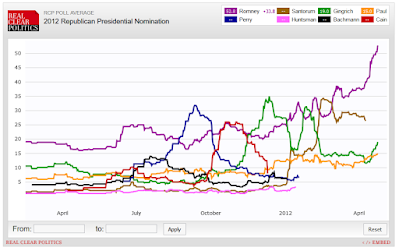First off, a definition. When a candidate who much of the party is dissatisfied with takes an early commanding lead, a middle to bottom of the pack name will suddenly start generating tons of buzz and see a big jump in the polls. These are not-__________ candidates, and they tend to follow a remarkably similar arc.
The thing to remember is that these dissatisfied voters feel huge pressure to converge on some alternative, someone all of them can get behind. This is not just a Keynesian beauty contest, more like a Keynesian beauty contest where you have to marry the winner. These conditions put the dissatisfied in an extremely receptive mood, where they are inclined to default to optimism and to fill in the blanks with what they'd like to see.
The best display we've seen of not-_____ candidates was the 2012 GOP primary. From the start, Romney had a commanding but not insurmountable lead, but the evangelicals in the GOP distrusted Mormons and the entire party hated Obamacare, so a substantial portion were looking for a not-Mitt. The result was support converging around a succession of not-Mitts then dissipating to make way for the next. Perry, Cain, Gingrich, and Santorum all topped Romney then (with the exception of Gingrich's mid-run dip) followed the same pattern. If we broaden the definition to leading non-Romney candidates, we could add Bachman.
[Time scale isn't what I would have chosen, but RCP refuses to apply my changes.]
In each case pundits came up with a new set of none-too-believable reasons to explain the rise and fall. such Cain's gimmicky flat tax/national sales tax proposal (despite the fact that neither idea had ever been a winner with voters in either party). While the explanations we were given weren't credible, they were consistent with the standard narratives, unlike the obvious answer.
Pressure to converge and constant feedback loops led to symmetry-breaking. A slight nudge (like announcing a silly tax plan) would cause an "I hear people are talking about _____" effect which would send a candidate shooting up, at which point voters would take a good look and decide he or she couldn't beat Romney and the support would evaporate.
The obvious lessons here (and from 2016 and from 2020) are that the candidate who dominates the polls is likely to get the nomination and that the not-the-frontrunner candidates who rocket up in the polls almost always fizzle out, but somehow it seem like none of the journalists covering politics have made those connections.

No comments:
Post a Comment